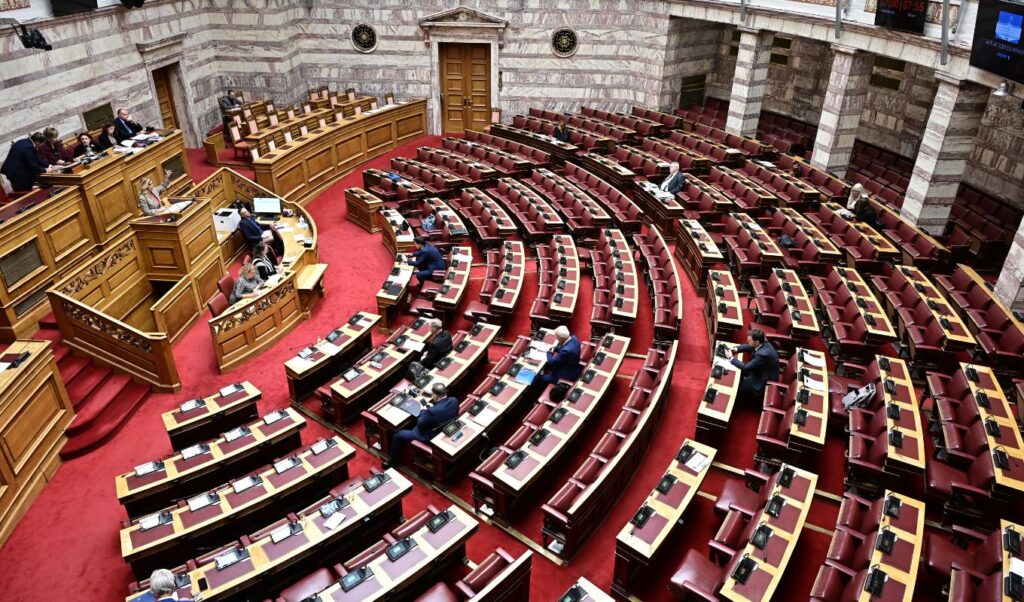Significant changes to the Parliament’s Rules of Procedure will be brought by the “time cutter” that will be voted on today, Thursday (30.10) by the Parliamentary Plenary. This is because the implementation of the “time cutter” will bring changes to the speaking times of political leaders, ministers and MPs, in an effort to achieve better time management so that more members of Parliament can speak from the podium.
Last Thursday, during an explosive session of the Conference of Presidents, Parliament Speaker Nikitas Kaklamanis proposed the changes, which however did not find agreement from the head of Plefsi Eleftherias, Zoe Konstantopoulou, who went into… rebellion, showing her opposition to the implementation of this specific measure.
Parliament: What changes with the “time cutter”
The presidential proposal passed by majority and, among other things, will bring an additional 25% time to all speakers. However, when this is covered, then the “time cutter” will be implemented. In simple terms, microphones will automatically turn off and therefore nothing will be written in the Minutes and the Parliament camera will show the Plenary hall.
According to the proposal in Plenary sessions for voting on bills and during parliamentary control:
a) rapporteurs and speakers, instead of 22 minutes, with tolerance will now have 28 minutes,
b) parliamentary representatives, instead of 21 minutes, will have up to 27 minutes,
c) MPs, instead of 7 minutes, will have 9 minutes,
d) presidents of parliamentary groups with 50 or more MPs, instead of 20 minutes, will have 25 minutes,
e) presidents of parliamentary groups with fewer than 50 MPs, instead of 15 minutes, will now have 19 minutes and
f) competent ministers, instead of 10 minutes, will have 13 minutes.
However, the “time cutter” will not apply to critical sessions, such as those concerning votes of confidence, motions of no confidence, budget voting, Prime Minister briefings and pre-agenda discussions at political leader level, as parliamentary group presidents will continue to have sufficient time – with relative tolerance from the presidency – for their speeches.
At the same time, political leaders who have dual capacity – a characteristic example being Zoe Konstantopoulou – cannot exploit this privilege to continuously make speeches and interventions. In parallel, ministers and political leaders will be able to request the floor up to 3 times per day and based on the new time limits that the Plenary will decide today.
“Time cutter” in Parliament: Zoe Konstantopoulou spoke of unholy alliance
It should be noted that yesterday, Wednesday, during the discussion of the draft law of the Ministry of Health “Regulations for strengthening public health and upgrading health services”, Zoe Konstantopoulou requested the floor to denounce that an unholy alliance of persons who are bothered by Plefsi Eleftherias is developing, the only force that exercises “real opposition”. She also referred to the Conference of Parliament Presidents, which “initiated the restriction of the opposition’s speech, the speech of opposition political leaders” and, as she denounced, the Conference revealed the collaboration of Vice-President Olga Gerovasili with the “prime minister’s sister, Ms. Bakogianni”.
Specifically regarding the relevant proposal to amend Parliament’s Rules of Procedure, Zoe Konstantopoulou said the goal is “a conveniently quiet Parliament”, because “lively opposition” bothers “especially those who when they were in opposition position, like Ms. Gerovasili, did not act as opposition”. In this climate, Ms. Konstantopoulou said that the alliance that manifested in the Conference of Presidents is unholy, just as unholy was the alliance for Siemens and for the escape of the defendants accused in Siemens, even though they had a travel ban from the country, when Ms. Bakogianni was political superior at the Foreign Ministry.
“Ms. Gerovasili rushed to defend Ms. Bakogianni at the Conference of Presidents. This is what you want, a kingdom state, with Mr. Mitsotakis as king and princess, Marie Antoinette, Ms. Bakogianni. We don’t want this. We want democracy. And in democracy these machinations don’t happen, nor are there such dark paths of a vice-president, who comes from the opposition, but supports, at the critical moment, the government, covering for Tasoulas regarding the lost case files of Tempe or defending Bakogianni, while she is accountable,” concluded the head of Plefsi Eleftherias.




